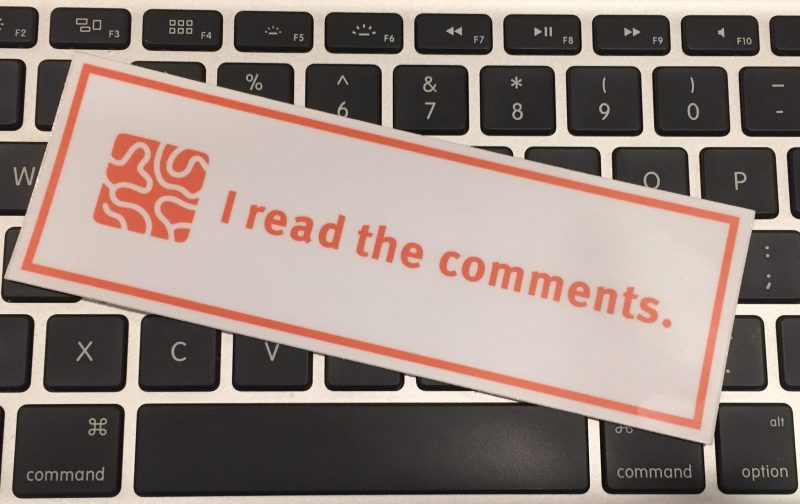The Coral Project believes that creating spaces for our communities to engage with our work is essential to the act of journalism. So they’ve set out to turn the axiom “don’t read the comments” on its head.
Their first product, a tool for managing user-generated content called Ask, will be released on Monday.
“People want to make your journalism better,” Sydette Harry, community lead for The Coral Project, said at “Do Audience Better,” a Thursday afternoon panel at the Online News Association annual conference in Denver. “And they want to do it together.”
The Coral Project, a collaborative effort between the Mozilla Foundation, The Washington Post and The New York Times, has spent more than a year researching how to fix comments on news sites and building open-source tools.
Many organizations have let the area beneath their articles become the unattended domain of trolls and partisans: the metaphorical dumpster fire. Other outlets, including NPR, have experimented with disabling their comment sections entirely.
The Coral Project’s first tool, Ask, lets readers submit content, and then empowers companies to curate, edit and display that content. At first glance, Ask might seem a bit similar to form builders such as Google Forms — but what sets it apart is how it lets you act on and use the information after it’s been submitted.
Ask lets you connect contributions to other user data you collect and quickly sift through and share the best submissions. All the data lives on your servers, so the news organization is in complete control. Like any good modern web product, the embeddable forms and galleries are responsive and can even adapt to your site’s style.
If you’re writing a story on police reforms in your community, you could use Ask to create and embed a form into your piece inviting readers to share experiences of their encounters with law enforcement. Ask will let you follow up with contributors, filter the responses, and then create a new article showcasing a gallery of the best submissions. The software builds safety and trust by helping users manage how much identifiable information they want attached to their comments.

Behind the technology is research. Lots of research.
The Coral Project spent the last year interviewing more than 300 people from nearly 150 news organizations across the world. They also interviewed academics, trolls and prolific commenters.
“Ask allows users to have more consent about what it means to participate and to answer as much or as little as they feel comfortable answering,” said Harry. “It is about making the bar of entry low and making informed consent high.”
Andrew Losowsky, project lead for The Coral Project, said that the “performative nature of comments” often discourages participation from marginalized groups. Alternative ways of engaging (like Ask) will help to create a safer space for everybody to participate in the online communities we host.
If you’d like to see a demo of Ask, would like us to walk you through the Lab, or just want to talk, hit reply! We’re at #ONA16 all day.
— Coral by Vox Media (@coralproject) September 16, 2016
Speaking from experience, working on various user-generated content projects as an intern at The New York Times (one on stillbirths and one for a cartoon contest) required a hodgepodge of tools to solve the entire process of requesting, curating, editing and displaying content from your audience.
By itself, Ask seems a great tool for managing that entire process.
But Ask doesn’t live in a silo. What makes it particularly powerful is how it integrates with the other tools the The Coral Project is building.
Ask, along with a commenting platform called Talk, will integrate with a tool called Trust, a “system that manages the reputations of users, allowing publishers to stratify their users by levels of trust.”
“Any user who interacts with the news organization, whether it’s through slow-twitch UGC or fast-twitch, you’ll know who they are and how they’ve interacted with you over time,” said Greg Barber, director of digital news projects at The Washington Post and head of strategy and partnerships at The Coral Project. “You’ll be able to understand if you’re meeting this person for the first time or if you’re meeting an old friend.”
Starting Monday, developers will be able to clone Ask from GitHub and install it for their newsrooms. The Coral Project tried to make installing and integrating Ask as easy as possible, but it also has developers on staff to help smaller organizations get started with their suite of tools.
A lot of what The Coral Project is trying to accomplish doesn’t just require technology, but dramatic shifts in newsroom culture, resources and strategy.
“We’re not trying to create a new social network,” said Losowsky. “We are trying to create a different set of incentives.
“Our goal,” he continued, “is to find and encourage the best contributions possible to support the journalism, the best communities to be a part of the journalism, and the best intellections to help make the newsroom part of the community by giving it the tools to make a safe and secure place.






You must be logged in to post a comment.